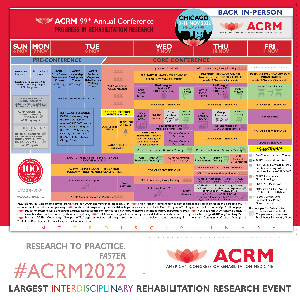Back
Diversity, Equity and Inclusion
Minority Serving Institutions and African American-Owned Technology Firms Barriers in Assistive Technology Research and Development
Friday, November 11, 2022
10:09 AM – 10:14 AM
Location: Station 2

Courtney D. Ward-Sutton, PhD, CRC (she/her/hers)
Assistant Professor
University at Buffalo
Buffalo, New York, United States
Presenting Author(s)
Research Objectives: The Objective was implemented at the exploratory and discovery stage of research to identify and describe Delphi panelists’ perspectives on AT-R&D participation barriers.
Design: A Delphi Technique, mixed-methods approach, was used to examine panelists’ perceptions on the importance of contextual AT-R&D barriers resulting from policy and systems issues across different categories.
Setting: Delphi technique group survey activities were conducted through PsychData online survey platform.
Participants: The sample consisted of n= 25, HBCU and Small African American-owned technology firms personnel with a wide range of knowledge on AT development.
Interventions: n/a
Main Outcome Measures: Nvivo analyzed the qualitative data collected in Round 1 and generated themes. SPSS version 28 was used to calculate quantitative data to describe the priority of importance rankings and ratings in Round 2 (e.g., M; SD; ∑Rank Point).
Results: Findings indicated the four most important barriers among HBCU stem faculty were: heavy teaching loads, research infrastructures, student advisement commitments, and grant review processes. Small African American-owned technology firms reported the following barriers: knowledge and development of entrepreneur skills, investment, access to sufficient capital loans, facilities, research collaborations between HBCUs and Techpreneurs, and labor markets/supply demands.
Conclusions: These findings provide information about what Federal research entity leaders and HBCU administrators can do to stimulate competitive disability and rehabilitation AT-R&D participation across the HBCU Community and African American-owned technology firms. Recommendations that can be considered for external and internal policy and systems modifications to address the current under-funding and under-participation of HBCUs as “grantees” across the Federal disability and rehabilitation AT- R&D enterprise’s.
Author(s) Disclosures: Acknowledgment: The contents of this article were developed under grants from the National Institute on Disability, Independent Living, and Rehabilitation Research (NIDILRR grant numbers 90AR5029, and 90RTST0001). NIDILRR is a Center within the Administration for Community Living (ACL), Department of Health and Human Services (HHS). The contents of this article do not necessarily represent the policy of NIDILRR, ACL, HHS, and one should not assume endorsement by the federal government.
Design: A Delphi Technique, mixed-methods approach, was used to examine panelists’ perceptions on the importance of contextual AT-R&D barriers resulting from policy and systems issues across different categories.
Setting: Delphi technique group survey activities were conducted through PsychData online survey platform.
Participants: The sample consisted of n= 25, HBCU and Small African American-owned technology firms personnel with a wide range of knowledge on AT development.
Interventions: n/a
Main Outcome Measures: Nvivo analyzed the qualitative data collected in Round 1 and generated themes. SPSS version 28 was used to calculate quantitative data to describe the priority of importance rankings and ratings in Round 2 (e.g., M; SD; ∑Rank Point).
Results: Findings indicated the four most important barriers among HBCU stem faculty were: heavy teaching loads, research infrastructures, student advisement commitments, and grant review processes. Small African American-owned technology firms reported the following barriers: knowledge and development of entrepreneur skills, investment, access to sufficient capital loans, facilities, research collaborations between HBCUs and Techpreneurs, and labor markets/supply demands.
Conclusions: These findings provide information about what Federal research entity leaders and HBCU administrators can do to stimulate competitive disability and rehabilitation AT-R&D participation across the HBCU Community and African American-owned technology firms. Recommendations that can be considered for external and internal policy and systems modifications to address the current under-funding and under-participation of HBCUs as “grantees” across the Federal disability and rehabilitation AT- R&D enterprise’s.
Author(s) Disclosures: Acknowledgment: The contents of this article were developed under grants from the National Institute on Disability, Independent Living, and Rehabilitation Research (NIDILRR grant numbers 90AR5029, and 90RTST0001). NIDILRR is a Center within the Administration for Community Living (ACL), Department of Health and Human Services (HHS). The contents of this article do not necessarily represent the policy of NIDILRR, ACL, HHS, and one should not assume endorsement by the federal government.
Learning Objectives:
- Upon completion, the participant(s) will be able to identify critical barriers identified by Delphi panelists that impede HBCU STEM research scientists and faculty members from participating optimally in the federally AT-R&D enterprise.
- Upon completion, the participant(s) will be able to identify critical barriers identified by Delphi panelists that impede small African American-owned technology firms from participating optimally in the federally AT-R&D enterprise.
- Upon completion, the participant(s) will understand better what barriers federal funding research entities could address through capacity building and training programs to help improve the AT-R&D participation outcomes by HBCUs and small African American-owned technology firms.

.jpg)
